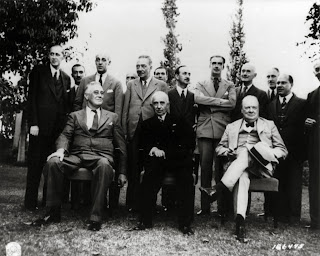Second Cairo tends to be overlooked, but of the three it was the one with the most direct connection with the affairs of the Middle East, the venue but not the subject of the others. As İnönü's presence receals, this was an effort, though an unsuccessful one, to bring Turkey into the wa on the Allied side.
Churchill, whose preoccupation with Europe and with attacking the enemy through the "soft underbelly of Europe" dateed to his championing of the Gallipoli campaign in World War I, was eager to outflank the Axis-controlled Balkans and had been urging an Allied occupation of Rhodes; bringing Turkey into the war was an element in his plans. FDR and the US Chief of Staff were never enthusiastic about these schemes, seeing them as distractions from the invasion of France.
Churchill had met secretly with İnönüearlier in the year in Adana; İnönü, who had succeeded Kemal Atatürk as President in 1938, was dubious; he feared an attack from Axis Bulgaria, and he suspected (correctly) that Stalin still harbored the ancient Russian desire for Constantinople. At Tehran, Stalin pledged to FDR and Churchill his willingness to assure İnönü that if Bulgaria dclared war on Turkey, the Soviets would declare war on Bulgaria. But Turkey was not reassured.
Churchill had also, earlier, supported a huge financial package for Turkfey, but FDR and Stalin reduced the size of the package, feeling bringing Turkey in was less critical.
İnönü's party leaderswhip did not want him flying to Cairo; Turkey proposed a meeting in Adana, or across the border in Aleppo, but in the end it was Cairo, and he flew in US Army plane from Adana to Cairo.
In the end, Turkey remained neutral. The dmaller financial package was part of it, but FDR and the American Chiefs, suspicious of what thet saw as a Churchill obsession with the Turkish Straits (and remembering Gallipoli), were not all that disappointed.
In the end. Turkey joined the Allies only in 1945, in the last weeks of the European war.







1 comment:
If you look very carefully in the second picture, the person standing behind the person behind President Roosevelt looks very much like General Sissi.
He would have had to be standing on a box.
Post a Comment